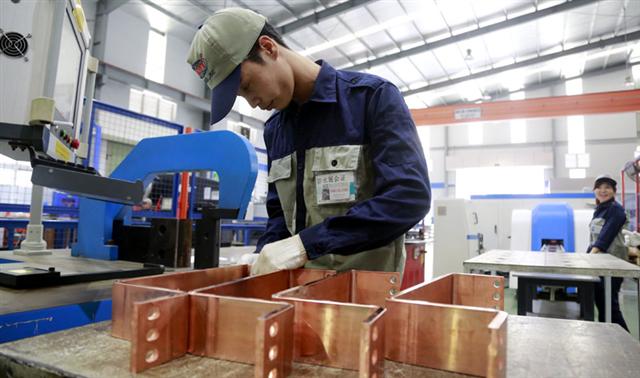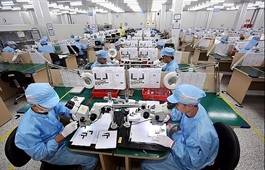Businesses’ interests should be priority for policy makers: Minister
Businesses’ interests should be priority for policy makers: Minister
In case of ambiguity in laws and regulations, government agencies should go for the option that brings the most benefits for enterprises, said an expert.
Government agencies should put businesses’ interests at the center of every decision-making process, in turn allowing the private sector to make greater contribution for socio-economic development.

Production of electricity equipment at A Chau Industry Company, located at Quat Dong Expansion Industrial Park, Hanoi. Photo: Thanh Hai
|
Minister of Planning and Investment Nguyen Chi Dung said at a conference discussing the state administration reform for the development of the private sector in Vietnam held on March 12.
At present, the private sector makes up 43% of the GDP and create jobs for 85% of the work force.
“A new mindset in state administration process is needed towards greater convenience for business activities to boost economic growth,” said Dung.
According to Dung, such change should be realized as quick as possible, especially as local enterprises are having golden opportunities for strong growth thanks to the presence of a number of free trade agreements (FTAs), new technologies emerged from the Industry 4.0, and the shift of global production chains.
The minister, however, said there remain restrictions for the development of the private sector, including a modest growth in productivity.
Dung referred to a recent survey that the average productivity of the private sector is equivalent to 34% of that of the state sector, and 69% of the foreign-invested sector.
Meanwhile, the majority of Vietnamese enterprises have not given the right attention for R&D, especially in mastering core and pioneering technologies.
A report from the Ministry of Planning and Investment (MPI) noted only 10% of the current operational enterprises have successfully applied for one patent in three consecutive years.
The MPI added investment capital for technologies and innovation from Vietnamese enterprises make up 0.3% of their total revenue, significantly lower than those in India (5%) and South Korea (10%); and 10.2% have been engaging in R&D activities.
On the shortcomings of the local business community, economist Pham Chi Lan pointed out the weak linkage among Vietnamese firms.
“Local firms should improve their linkage and cooperation with each other to enhance competitiveness and have better change in taking part in the regional and global value chains,” Lan added.
At present, only 21% of small and medium enterprises (SOEs) in Vietnam are part of the global value chains, and 14% have been successfully in establishing partnership with foreign partners.
“The rate remains low given the large number of FDI enterprises currently operating in Vietnam,” said Lan.
Giving opportunity for private sector
Vice Director of the Central Institute of Economic Management (CIEM) Phan Duc Hieu added over the years, the government has been gradually reducing its presence as an investor, while opening more opportunities for other economic sectors in fields such as education, healthcare, culture, or pushing for the privatization and state capital divestment at public firms.
To ensure breakthroughs in the development of the private sector, Hieu expected the state to better clarify its role in a market economy, at the same time pushing for more enterprises to provide public services and refraining from intervening in the internal process of enterprises.
“A fair competitive environment is essential for the private sector to grow, while the allocation of state resources should focus on those that would bring the most effective socio-economic impacts,” he added.
Hieu also said in case of ambiguity in laws and regulations, government agencies should go for the option that bring the most benefits for enterprises.


























